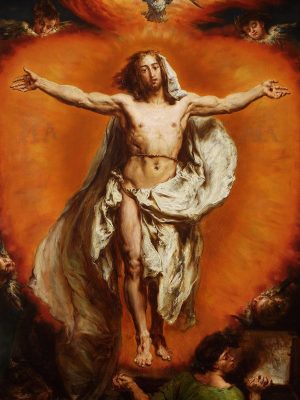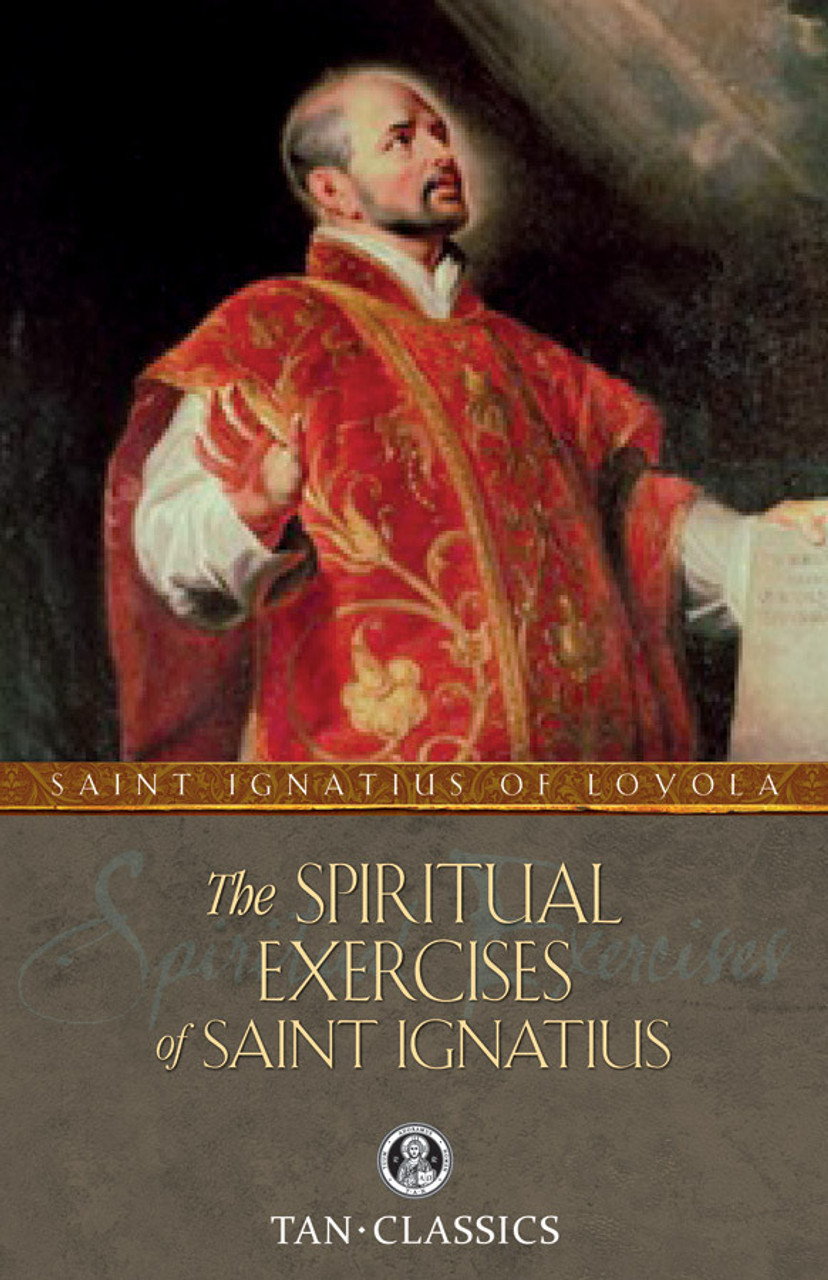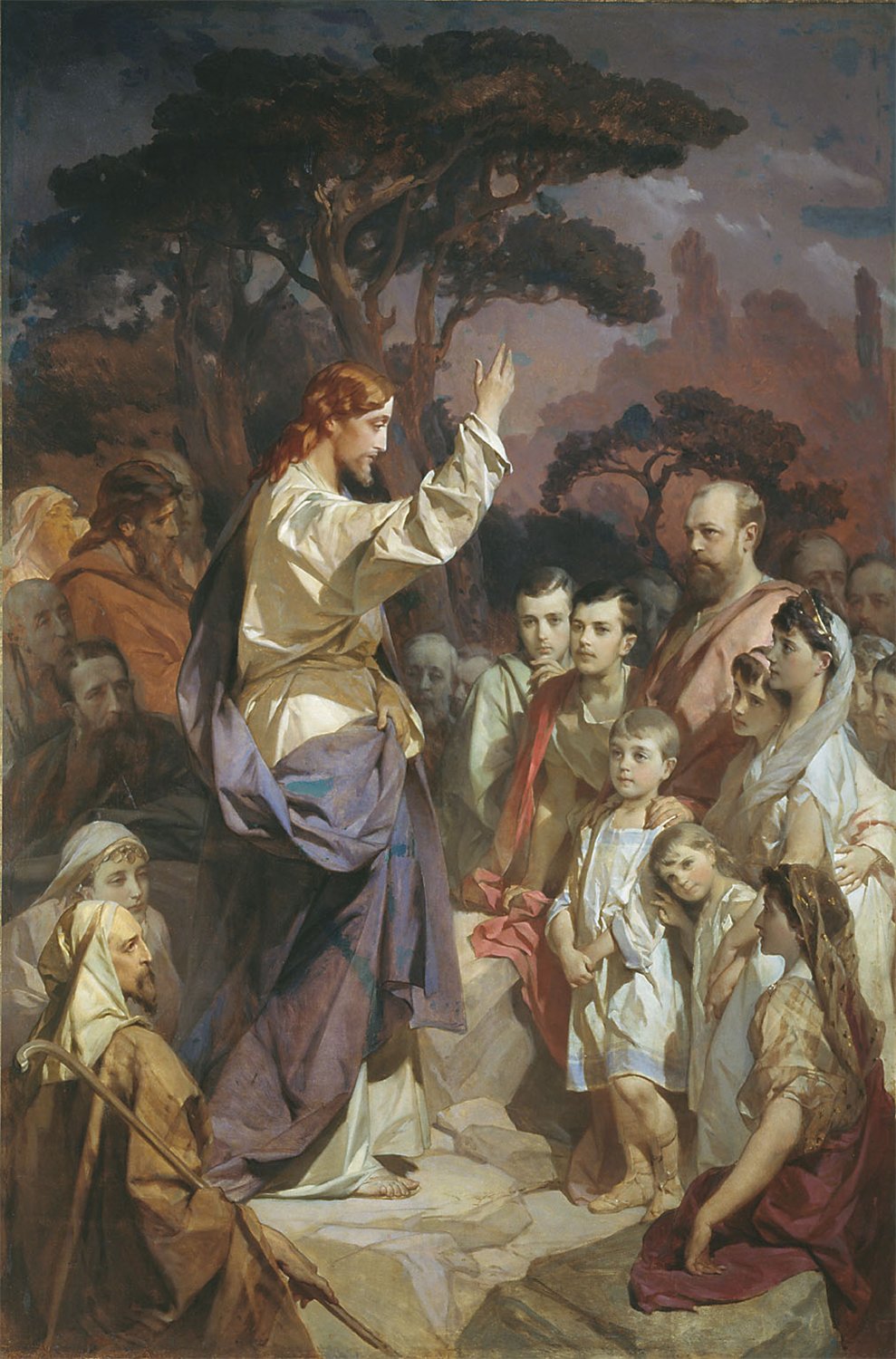In Heaven, Christ suffers no more—and neither will the Christian who follows Him. Freed from pain, sorrow, separation, temptation, and sin, the elect share in Christ’s glory and eternal joy. This meditation stirs a deep longing for Heaven, where God will wipe away every tear and unite His faithful forever in perfect peace.
First prelude. Represent to yourself Our Lord seated on His throne at the right hand of His Father; beside Him the Blessed Virgin; around the throne the angels and the elect.
Second prelude. Beg for an ardent desire of heaven, and the courage to suffer on earth with Jesus Christ, that you may one day reign with Him in eternity.
Jesus Christ in Heaven suffers no more
Consider that Our Lord in heaven is free from all the trials and pains that He experienced in His mortal life. His body, since His resurrection, is withdrawn from the empire of weakness and death. His soul, inundated with the delights of the divinity united to Him, is henceforward a stranger to sadness and desolation.
In heaven, the Christian, like his Divine Head, will be forever freed from all bodily pains and from all afflictions of the soul.
1. In heaven there are no more infirmities. The body, clothed with the glory of Jesus Christ, will be raised, like that of the Saviour, to a state of impassibility: “Who will reform the body of our lowness, made like to the body of His glory” (Phil. 3:21). In this abode of perfect beatitude the blessed no longer know what it is to suffer and die: “And death shall be no more” (Apoc. 21:4).
2. In heaven there is no more grief or sorrow. “Nor mourning, nor crying, nor sorrow shall be any more” (Apoc. 21:4). Here below, what is life but one long unceasing affliction? In heaven, all tears are dried: “God shall wipe away all tears from their eyes” (Apoc. 7:17). They remember past sorrows, but this memory is for the elect a part of their beatitude. Each one of them, like the prophet, applauds his past trials. Each one of them says, Happy tribulations, which are now repaid by an immense weight of glory: “We have rejoiced for the days in which Thou hast humbled us; for the years in which we have seen evils” (Ps. 89:15).
3. In heaven there are no more separations. Here below, to poison the sweets of friendship, this thought alone suffices: “How long will the society of these friends, of these relatives so tenderly loved, continue? But once in the bosom of God, the elect meet to part no more. What joy for a Christian family to meet again, after the long and sad separation of the grave! What joy to be able to say with confidence, “We are again united, and it is for eternity!”
4. In heaven there are no more temptations. Here on earth is for the Christian a struggle of every day and every moment; and in this struggle a continual danger of losing the grace of God, his soul, and eternity. Hence the groans of the saints, who never cease crying out with the
prophet, “Woe is me, that my sojourning is prolonged” (Ps. 119:5); or with the Apostle, “Unhappy man that I am, who shall deliver me from the body of this death?” (Rom. 7:24). The lament of the exile is never heard in this country. There is no longer anything to fear from the world, which has no more illusions; nor from hell, which is conquered; nor from our own hearts, which only live for Divine love. There everything says, as did formerly holy King David, “He hath delivered my soul from death, my eyes from tears, my feet from falling. I will please the Lord in the land of the living” (Ps. 114:89).
5. In heaven, above all, there is no more sin. Recall what you have meditated on the malice of sin. It is the supreme evil, the one only evil of time and eternity; the sole evil of the creature, the great evil done against God. Banished into hell, sin cannot penetrate into the kingdom of charity. Oh, the happiness of that day, when, entering into heaven, the elect shall say, My God is now mine, and I am His! “My beloved to me and I to Him” (Cant. 2:16). I am united to Him forever, and sin can never separate me from Him: “I held Him, and will not let Him go” (Cant. 3:4).
ooo
This article is taken from a chapter in Spiritual Exercises of Saint Ignatius by Saint Ignatius of Loyola which is available from TAN Books.









